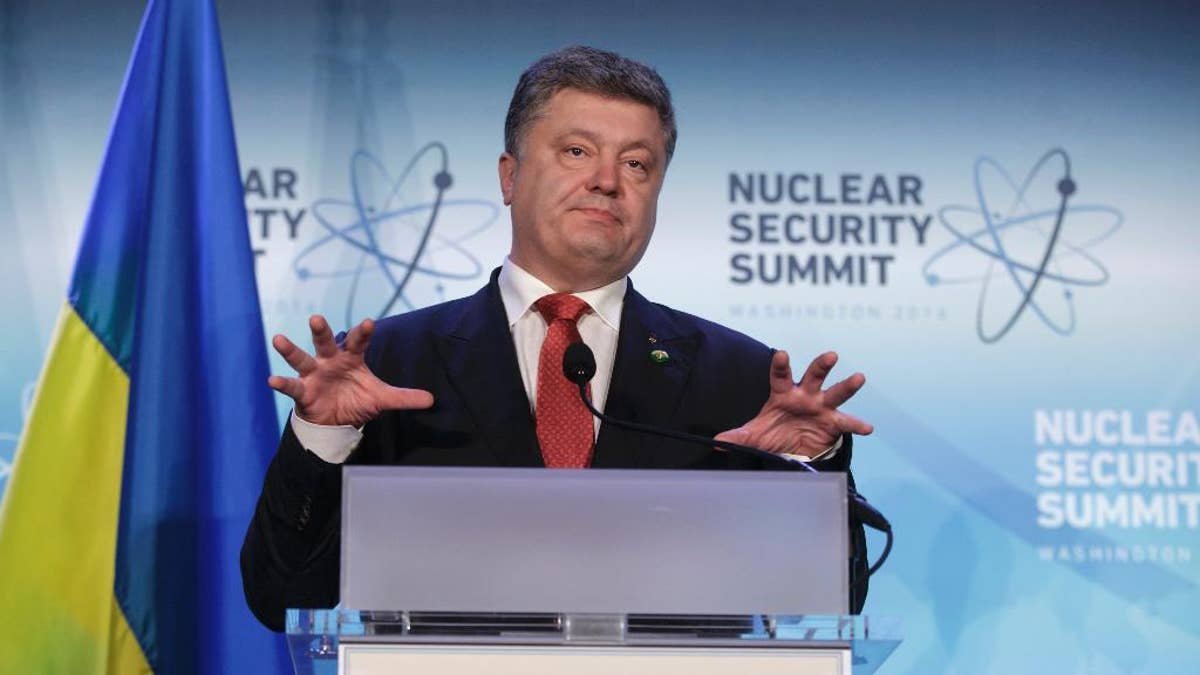
Ukrainian President Petro Poroshenko holds a news conference after meetings at the Nuclear Security Summit in Washington, Friday, April 1, 2016. (AP Photo/J. Scott Applewhite) (The Associated Press)
THE HAGUE, Netherlands – Dutch voters are going to the polls on Wednesday — but the topic is Ukraine, not their own country.
When Ukrainians rose up against their government in February 2014, the trigger for their anger was then-President Viktor Yanukovych's refusal to sign an agreement fostering closer links between his country and the 28-nation European Union.
After Yanukovych was toppled, his replacement, Petro Poroshenko, moved ahead and signed the Association Agreement with the EU, a broad free trade deal that — supporters say — also seeks to tackle corruption and improve human rights in the troubled former Soviet republic.
Now, long-simmering anti-EU sentiment in the Netherlands threatens the deal, much of which is already in force. In a non-binding "advisory referendum" on Wednesday, the Dutch can vote for or against Dutch ratification of the deal with Ukraine.
While the Ukraine agreement is nominally the target, the referendum is seen by many as an opportunity to protest the EU's expansion and what they consider its undemocratic decision-making processes.
"We, of course, couldn't care less about Ukraine," history professor Arjan van Dixhoorn, one of the leaders of the euro-skeptical Citizens' Committee EU that pushed for the referendum, told the Dutch newspaper NRC Handelsblad.
His organization really wants a referendum on whether the Dutch should leave the EU — just like the vote Britain is holding on June 23 — but there is no way to force such a referendum under Dutch law. The Netherlands is a founding member of the EU, but support has long been mixed in this country of 17 million, which in 2005 voted against the bloc's proposed constitution.
Under a 2015 law that created advisory referendums, the Dutch result is valid only if Wednesday's turnout is over 30 percent. If a majority votes against the deal, the government can pass a new law effectively withdrawing its ratification, or it can advise parliament to uphold the ratification.
EU Commission President Jean-Claude Juncker says the stakes are high, telling news website NRC.nl that a "No" vote "would open the door to a great continental crisis."
In recent weeks, Ukrainian leaders have visited the Netherlands and Dutch lawmakers have flown to Kiev in an effort to swing the vote in favor of the association agreement. Poroshenko, meeting with Dutch parliamentarians, called the agreement "a real road map for the internal transformation" of Ukraine.
Dutch supporters of the deal agree, saying it pushes Ukraine toward economic reforms and helps fight corruption, improve human rights and better protect minorities in Ukraine.
The Ukrainian Foreign Ministry has accused Russia of feeding anti-Ukrainian sentiment ahead of Wednesday's vote, a claim that Russian officials reject.
"I would like to refute those who are trying to see Moscow's influence in this referendum," Vladimir Chizhov, Russia' envoy to the EU, told the Izvestia daily. "Apart from the fact that we never interfere in things like this, it is not going to change anything for Russia politically. Terms of the EU-Ukraine Association Agreement have been in temporary implementation since Jan. 1. The damage has been done."
Opponents portray the association agreement as a sign of unwanted EU expansionism, and some argue it will not benefit most Ukrainians. Lawmaker Harry van Bommel of the Dutch Socialist Party says its free trade provisions will only serve to enrich large multinationals and Ukrainian oligarchs.
"Those who put the interests of ordinary Ukrainians first should vote against this neo-liberal free trade treaty," he wrote.
Deputy Prime Minister Lodewijk Asscher told reporters in The Hague on Friday he would be voting in favor of the agreement, which the government insists does not open the door to EU membership for Ukraine.
"It ensures stability — a stable neighbor on the edge of Europe," he said. "It also ensures more and easier trade."
